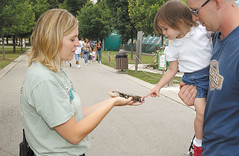
It’s exciting when you witness someone discover their passion through volunteering. Kathy Kelley started volunteering a decade ago at the Morton Arboretum, a 1,700 acre outdoor living museum in suburban Chicago. Through the years, her identity and pride as an Arboretum volunteer has grown tremendously. So, what made volunteering there take root?
We sat down with her to learn more about her incredible volunteer experience and what keeps her coming back, year after year.
What inspired you to start volunteering at the Morton Arboretum?
Kathy: This is my 10th year volunteering at the Arboretum. One of my good friends was volunteering one weekend at a big fall festival and I got hooked on it. Now, the process of becoming a volunteer is much different; you apply and have an interview. The Arb has 1,592 volunteers in all capacities. They have people who work every week taking out invasive species. They have people who help with mailings. They have all ages. You find your niche. My first year, I did 3 hours and 30 minutes. The second year I had 27 hours. This year, I will have over 300 volunteer hours.
Do you get any perks as a volunteer?
Kathy: You’re considered an active volunteer if you volunteer 40 hours or more a year. You get 20 percent off at the store and free admission for two people for the year. Every quarter you can get 20 percent off a class and every year they have a big volunteer appreciation dinner. You get a voucher for a free drink every time you volunteer for a coffee or soft drink. They provide special volunteer parking and entrances. They’re always saying ‘Thank You.’ Even when you’re driving out, there’s a sign that says “Thank You Volunteers.”
What’s your relationship with the volunteer coordinators like?
Kathy: They’re wonderful. There’s two people – Kristin and Lucy – and they’re very appreciative. They’re very accommodating. I always bring them a box of candy at Christmas, just because when you’re working with 1,500 volunteers you get some crankypants. You log-in and post your hours on their volunteer portal, but it’s interesting because I work now a lot with special events, so they’ll text me and ask if I want to work certain things.
What motivates you to volunteer so much?
Kathy: It’s my happy place. I love walking there every week, and their mission. As my professional and caregiving responsibilities lessened, I have had more time to give. [The Arboretum] is where I have chosen to spend my extra time. It’s a beautiful place, it’s a calming place. It’s also less than a mile from my house, but I know people who drive in from all over. It’s social. Some people you’ll work with just once, but others you get to see regularly and know. There’s also pride in ownership, when I take on tasks, like overseeing 5K shirts. It’s a self-motivation. I always try to see if I get a few more hours. I like working special events. I like being able to be part of the experience.

Why is volunteering important in your life?
Kathy: I’ve always been a volunteer. It was instilled in us when we were little. It’s the way we were brought up. I don’t have a lot of the financial means to support something, although the Arboretum is where I have donated, but I have always thought it’s just a way of supporting an organization you believe in.


 Are there any festivals or performers that you’ve been particularly excited about this
Are there any festivals or performers that you’ve been particularly excited about this